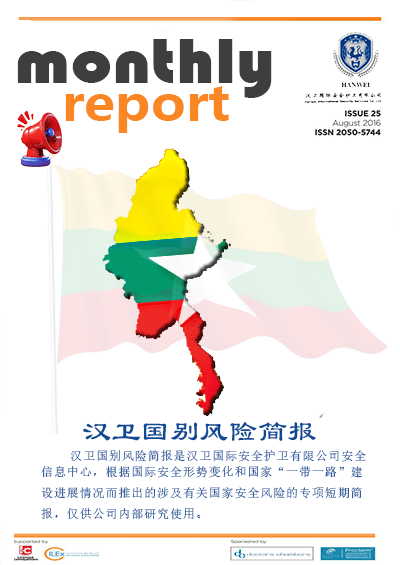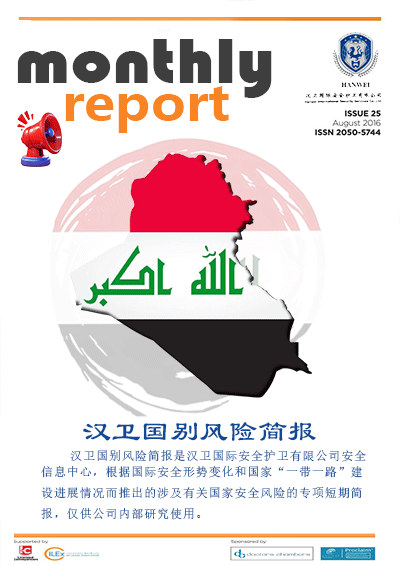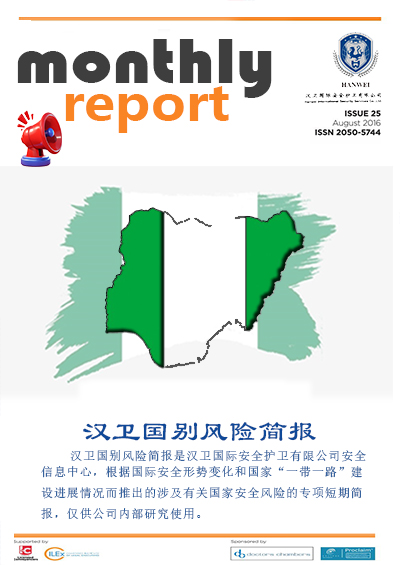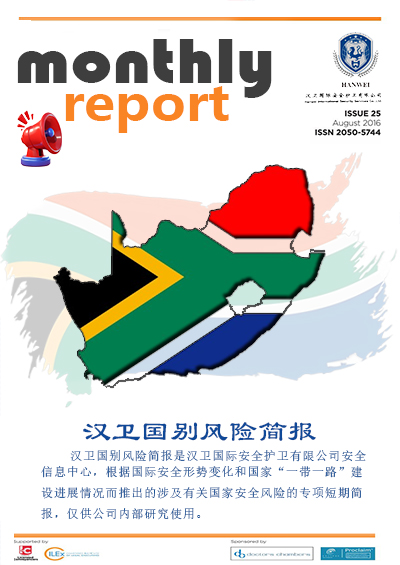South Africa Security Situation Overview (September)
Researcher No. 006
Based on monitoring reports from Hanwei International's security officers stationed in South Africa and relevant media coverage, Hanwei International's analysis indicates that South Africa is confronting multiple challenges. Politically and economically, the African National Congress (ANC) faces instability within its ranks, while the Patriotic Alliance (PA) has announced its withdrawal from the coalition government; industrial crises and livelihood hardships are intertwined, with government corruption further exacerbating these issues. In terms of social security risks, the proliferation of firearms in South Africa has led to a persistent surge in kidnappings, shootings, and robberies, posing severe threats to the lives and property of the public. In other aspects, South African authorities have continued to conduct intensive surprise inspections on Chinese-owned businesses in Johannesburg.
I. Politics and Economy
(1) ANC Faces "Internal Turmoil and External Pressures," with Its Ruling Foundation Continuously Eroded
On September 1, 2025, Stanley Mathabatha—Chairperson of the African National Congress (ANC), South Africa’s ruling party, and former Premier of Limpopo Province—submitted his resignation. In a letter to the party, he explicitly pointed out the prevalence of unethical behavior within the ANC and the growing erosion of the organization’s integrity. He also named specific provincial-level procedures in some regions that seriously deviate from the party’s core values, noting that a "non-ANC" culture is increasingly taking root. Meanwhile, John Mpe, Mayor of Polokwane (the capital of Limpopo Province), has faced public scrutiny over allegations of irregular tendering and providing political and economic benefits to foreigners. Although no formal charges have been filed, the incident has heightened public concerns about the government’s integrity in governance.
On September 27, Gayton McKenzie—leader of South Africa’s Patriotic Alliance (PA)—announced his resignation as Minister of Sports, Arts and Culture, and led his party to withdraw from the coalition unity government at the national, provincial, and local levels. He accused the ANC of breaking its promises and marginalizing its allies; particularly in the Gauteng Provincial Coalition Government, after the PA was forced to hand over the "Human Settlements Department" in Johannesburg, it only retained the Department of Transport and Roads—its originally allocated portfolio.
Combined with the political disputes between the ANC and the Democratic Alliance (DA) last month, as well as the ANC’s national approval rating dropping below 30%, this split has further intensified the coalition governance crisis. The ANC now faces not only internal division but also the impact of a fractured alliance. This situation will also affect local government decision-making and resource allocation, leading to a decline in public trust.
(2) South Africa’s Economic and Livelihood Dilemmas Intertwined, Exacerbating Security and Crime Risks Industrial Crisis
On September 23, reports indicated that the Congress of South African Trade Unions (Cosatu) held a meeting and pointed out that since 2008, South Africa’s economic growth rate has averaged only 1% annually, with unemployment reaching nearly 43%, and layoffs sweeping across multiple industries. Among these, ArcelorMittal South Africa (AMSA)—a 78-year-old steel giant in the country—announced the closure of its long steel products business and the phased layoff of 3,500 employees starting in September. This impact is expected to spread to the steel value chain and downstream manufacturing sectors, with trade unions warning of a broader industrial crisis.
Livelihood Hardships
In early September, multiple communities in western Johannesburg (Gauteng Province) faced a severe water supply crisis due to outdated water supply systems and pump station failures. From years of unstable water supply to a complete water cutoff in the past two weeks, residents have struggled to meet their basic living needs. On September 10–11, local residents staged violent protests against the water crisis, burning tires and setting up roadblocks. The police dispersed the crowd using rubber bullets and tear gas, resulting in multiple injuries.
On September 20, reports noted that nearly 1,000 informal settlements have emerged in the three major metropolitan areas of Gauteng Province: Tshwane (where Pretoria is located) is the most severely affected, with the number of informal settlements surging from 210 in 2021 to 502 this year; Johannesburg has seen an increase from 181 in 2016 to 352 now; and Ekurhuleni has 125. These informal settlements lack standardized management and coverage by law enforcement, easily becoming "lawless zones" for criminal gangs. Illegal activities such as robberies, murders, thefts, and gang fights occur frequently, posing severe threats to the lives and property of residents in and around the informal settlements.
(3) Frequent Local Corruption Cases in South Africa, with Anti-Corruption Campaign Intensifying
On September 3, reports stated that Lebo Moepa—a senior official of the municipal committee responsible for urban planning in South Africa—was under investigation by the Directorate for Priority Crime Investigation (Hawks) on suspicion of accepting 186,000 rand in "coordination fees" from real estate developers. Part of the funds was directly transferred to the official’s personal account, involving corruption and money laundering, and may be linked to a larger interest network.
On September 18, the Hawks raided the Polokwane Municipal Hall in Limpopo Province to investigate a tender corruption case involving over 225 million rand. The contracts are suspected of being awarded to companies associated with relatives of senior municipal officials.
On September 22, South Africa’s Department of Public Works and Infrastructure (DPWI) announced that 40 contractors had been blacklisted for corruption and non-performance, further demonstrating its determination to hold non-compliant enterprises accountable.
Corruption in local government, such as municipal tenders, directly harms public interests. The decline in the government’s governance capacity has led to gaps in livelihood services such as infrastructure—exemplified by this month’s water crisis in Johannesburg, which triggered public protests. Incidents such as road blockades and violent confrontations between residents and the police may occur more frequently.
II. Social Security Risks
(1) Kidnapping Incidents
In September, kidnapping cases in South Africa involved diverse groups, including foreign nationals from India and Ethiopia, as well as businessmen and ordinary citizens. Some cases even resulted in the tragic deaths of hostages.
Gauteng Province: On the evening of September 3, South Africa’s Anti-Kidnapping Task Force shot and killed "Dollarman"—a Mozambican-born kidnapping kingpin suspected of participating in at least 5 violent crimes including kidnappings—near the Kempton Park Highway. On the early morning of the following day, the task force rescued an Indian businessman who had been abducted on July 23.
Eastern Cape Province: On September 10, the provincial police, in collaboration with multiple departments, rescued an Ethiopian man who had been abducted in an ambush and arrested 3 suspects.
Western Cape Province: On September 9, Roger Brijlal—a 59-year-old businessman—was abducted while on his way to work, with the kidnappers demanding a ransom; his body was suspected to be found on the 16th. On September 12, a 28-year-old man in Cape Town was abducted, and his body was found in a residential area in the early morning of the following day, suspected to have been killed and dumped.
(2) Shooting Incidents
In September, the situation regarding shootings in South Africa remained severe, with Gauteng Province and Western Cape Province becoming the hardest-hit areas. Cash-in-transit robberies accompanied by gunfights occurred repeatedly, and random, indiscriminate shootings targeting innocent people, as well as industry-related violence, continued to escalate.
Western Cape Province: From late August to early September, violent incidents in the taxi industry occurred frequently in the province. Multiple individuals, including the Vice-Chairperson of the Cape Town United Taxi Association, were shot and killed. The provincial government announced that starting from September 17, 9 taxi routes and some stations in Khayelitsha, Somerset West, and other areas would be temporarily closed for 30 days. On September 8, a fatal shooting occurred in the Eikendal area of Cape Town, Western Cape Province, killing 2 men. On the 9th, 2 shooting incidents occurred within 10 minutes in the Wallacedene suburb, resulting in 4 women dead and 1 injured.
Gauteng Province: On September 1, a cash-in-transit vehicle in Boksburg, Gauteng Province, was attacked by 8 armed suspects who used explosives to break into the vehicle. A fierce gunfight then erupted between the suspects and security personnel, leading to the death of 2 innocent passersby who were hit by stray bullets.
(3) Robbery/Theft Incidents
Currently, robbery and theft incidents in South Africa show signs of spreading across all regions and targeting diverse locations, involving public places such as schools, churches, and tourist attractions—even including military-industrial facilities with relatively high security levels.
Special Sectors: On August 31, villagers in Nqobo, Eastern Cape Province, apprehended three key suspects in the theft of firearms from the Armscor dockyard in Simon’s Town, Western Cape Province. Since July, the suspects had freely entered this "high-security" facility, stealing multiple firearms and mobile phones; some of the stolen firearms even flowed into gang organizations in Western Cape Province.
Campus Theft: Security incidents have occurred frequently at many South African universities. The University of Johannesburg alone recorded 662 security incidents in 2024, while six universities—including the University of Johannesburg and the University of Pretoria—have recorded 449 robbery/theft cases this year, with frequent theft of valuables such as mobile phones and laptops.
Public Places: Churches in areas such as Bushbuckridge, Mpumalanga Province, have been successively robbed at gunpoint. In one case, 6 armed robbers broke into a church during a prayer session and looted 60 worshippers. On September 3, a female hiker was violently robbed—including being choked and beaten—at the Table Mountain scenic area in Cape Town, Western Cape Province. Although the suspect was arrested, security risks remain prominent during the tourist peak season.
III. Other Aspects
(1) South Africa Continues Surprise Inspections on Chinese Business Districts
On September 9, municipal authorities in Johannesburg (Gauteng Province) conducted large-scale law enforcement operations in Hong Kong City in the city center, seizing counterfeit goods and identifying serious safety hazards such as insufficient fire-fighting equipment. Businesses were warned to rectify these issues within 30 days. On the 10th, inspections were carried out on 100 shopping malls and Chinese trade centers, focusing on issues such as identity verification and counterfeit goods. On the 11th, police cars reappeared in Cyrildene Chinatown in Johannesburg, leading to a significant decline in business for local merchants. On the 15th, the verdict was handed down in the 2019 Chinese "sweatshop" case in Johannesburg: 7 Chinese defendants each received a 20-year prison sentence, further demonstrating the intensity of regulatory compliance efforts.
On September 12, the Deputy Minister of Labor of South Africa led a team to inspect a Chinese-funded cement products factory in Rustenburg, North West Province. Issues were found, including the failure to sign standardized labor contracts, the employment of undocumented workers, and substandard equipment quality.
Recommendations from Hanwei International for Chinese-Funded Enterprises and Individuals in South Africa
Closely Monitor Developments to Avoid Political and Economic Security RisksIt is recommended to closely follow local political and economic news, and leverage information released by the Chinese Embassy in South Africa, government announcements, and social media to avoid areas prone to protests—such as government institutions and major transportation hubs. Given the intensification of South Africa’s anti-corruption campaign, enterprises in the country should strengthen internal management and eliminate all forms of bribery.
Strengthen Security Precautions to Counter the Threat of Prevalent Violent CrimesIn response to the severe situation of security incidents such as kidnappings, shootings, and robberies in South Africa, Chinese citizens are advised to maintain a high level of vigilance at all times, avoid traveling during high-risk periods such as nighttime or early morning, and stay away from areas with poor security—such as informal settlements. When going out, try to travel in groups; if necessary, hire professional security personnel. In the face of illegal threats, avoid direct confrontation with criminals; if necessary, prioritize personal safety over property, report to the police promptly after ensuring safety, and contact the nearest Chinese embassy/consulate in South Africa or Chinese police-community cooperation centers for assistance.
Abide by Local Laws and Regulations, and Operate in Compliance with the LawIn September, South African authorities focused on conducting surprise inspections on Chinese business districts in areas such as Johannesburg, Gauteng Province. It is recommended that Chinese merchants in South Africa comply with laws and regulations related to business operations, adhere to legal operation and employment practices—especially by signing formal labor contracts—and promptly check compliance in areas such as fire safety, equipment quality, and hygiene conditions. The production and sale of counterfeit products must be firmly prohibited.




